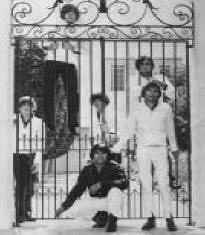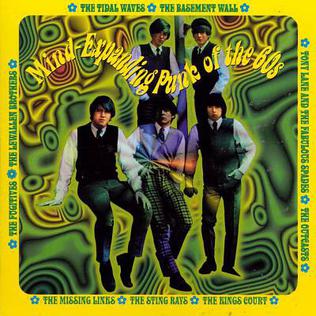Garage rock is a raw and energetic style of rock and roll that flourished in the mid-1960s, most notably in the United States and Canada, and has experienced a series of subsequent revivals. The style is characterized by basic chord structures played on electric guitars and other instruments, sometimes distorted through a fuzzbox, as well as often unsophisticated and occasionally aggressive lyrics and delivery. Its name derives from the perception that groups were often made up of young amateurs who rehearsed in the family garage, although many were professional.
Acid rock is a loosely defined type of rock music that evolved out of the mid-1960s garage punk movement and helped launch the psychedelic subculture. While the term has sometimes been used interchangeably with "psychedelic rock", acid rock also specifically refers to a more musically intense, rawer, or heavier subgenre or sibling of psychedelic rock. Named after lysergic acid diethylamide (LSD), the style is generally defined by heavy, distorted guitars and often contains lyrics with drug references and long improvised jams.
The Litter was an American psychedelic and garage rock band, formed in 1966 in Minneapolis, Minnesota, United States. They are best remembered for their 1967 debut single, "Action Woman". The group recorded three albums in the late 1960s before disbanding, but they re-united in 1990, 1992, and again in 1998, when they recorded a new studio album consisting of both old and new material. All of their Minneapolis recorded material was produced by Warren Kendrick, who owned the Scotty and Warick and Hexagon labels.
Nuggets is a series of compilation albums, started by Elektra Records in 1972 and continued by Rhino Records thereafter. The series focuses primarily on relatively obscure garage and psychedelic rock songs from the 1960s, but with some hits and pop-oriented songs also included.

The Human Expression was an American garage and psychedelic rock band from Los Angeles that released three well-regarded singles, and made additional demo recordings between 1966 and 1967.
Green Crystal Ties is an extensive series of compilation albums focusing on obscure and relatively unknown psychedelic and garage rock musical artists that recorded during the 1960s and early 1970s. Released on Collectables Records, Green Crystal Ties features ten total albums, all of which were issued in 1998. For the most part, the albums expand on past series distributed by Collectables Records and its contemporary Cicadelic Records, and as with Nuggets employ original master source elements when possible and arrange the various installments along contextual and conceptual lines. The music tends to be more refined in the earlier volumes of the series, progressively venturing out into more obscure and unknown material later much in the same fashion as the Pebbles or Back from the Grave series. The various installments are not ordered chronologically, but instead place emphasis on certain regions or musical styles. Although most of the music was recorded by American groups, there are a few exceptions such the heavy metal band Black Sabbath and King Richard and the Knights. Green Crystal Ties pays homage to the band the Zakary Thaks and their song of the same name. All of the entries are housed highly colorful packaging designed by Nicole Ruhl Fichera and each features a photograph of one of the compiled bands on the front cover. The packaging for all entries includes well-researched liner notes written by Steve Kaplan and Matt Wendelken which provide helpful biographical information about the bands and their songs.

Green Crystal Ties, Volume 10: 60s Garage Band Flashback is a compilation album featuring psychedelic and garage rock musical artists that recorded in the 1960s and early 1970s. It is the tenth and final installment of the Green Crystal Ties series and was released on Collectables Records on April 7, 1998. The album arguably features the most obscure musical artists featured in the series.

Green Crystal Ties, Volume 9: The Great Lost Psychedelic Garage Bands is a compilation album featuring obscure American psychedelic rock musical artists that recorded in the 1960s. It is the ninth installment of the Green Crystal Ties series and was released on Collectables Records on April 7, 1998. The album is considered one of the series best showings of psychedelic music.

Green Crystal Ties, Volume 6: Rarities from the Psychedelic Vaults is a compilation album featuring obscure psychedelic rock bands that recorded in the 1960s. It is the sixth installment of the Green Crystal Ties series and was released on Collectables Records on April 7, 1998. Though Volume 6 focuses specifically on psychedelia, the album is commended for featuring a wide-diversity of musical styles intertwined in the genre.

Green Crystal Ties, Volume 7: Mind-Expanding Punk of the 60s is a compilation album featuring American psychedelic and garage rock musical artists that recorded in the 1960s. It is the seventh installment of the Green Crystal Ties series and was released on Collectables Records on April 7, 1998. The album is not so "Mind-Expanding"—alluding to psychedelic music -- Volume 7 does offer the most hard-edged musical stance within the series.

Green Crystal Ties, Volume 1: Garage Band Rebels is the first installment in the Green Crystal Ties series of psychedelic and garage rock compilations issued by Collectables Records. It was released on April 7, 1998 and focuses on bands from Texas who were active in the 1960s and early 1970s such as the Zakary Thaks, The Bad Seeds, the Liberty Bell from Corpus Christi. Like all of the entries in the series, the highly colorful packaging is designed by Nicole Ruhl Fichera and on this occasion features a photograph of the Zakary Thaks on front. The inner sleeve includes through liner notes written by Steve Kaplan and Matt Wendelken which provide helpful biographical information about the bands and their songs.

Green Crystal Ties, Volume 2: The Best of the 60s Garage Band Scene is the second installment in the Green Crystal Ties series of psychedelic and garage rock compilations issued by Collectables Records. It was released on April 7, 1998 and features songs by obscure American musical artists who recorded in the 1960s and early 1970s. Like all of the entries in the series, the highly colorful packaging is designed by Nicole Ruhl Fichera and features a picture of the Basement Wall from Baton Rouge, Louisiana on front. The inner sleeve includes well-researched liner notes written by Steve Kaplan and Matt Wendelken which provide helpful biographical information about the bands and their songs.

Green Crystal Ties, Volume 3: Gloria Meets 96 Tears is the third installment in the Green Crystal Ties series of psychedelic and garage rock compilations issued by Collectables Records. It was released on April 7, 1998 and features songs by obscure American musical artists who recorded in the 1960s. Like all of the entries in the series, the highly colorful packaging is designed by Nicole Ruhl Fichera and on this occasion features a front cover photograph of Yesterday's Children, who are included in this set. The inner sleeve includes well-researched liner notes written by Steve Kaplan and Matt Wendelken which provide helpful biographical information about the bands and their songs.

Green Crystal Ties, Volume 4: Mind-Expanding 60s Psychedelia is the fourth installment in the Green Crystal Ties series of psychedelic and garage rock compilations issued by Collectables Records. It was released on April 7, 1998 and like volume 1 features songs by Texas garage and psychedelic bands who recorded in the 1960s. The series is known for good quality mastering and sound quality. Like all of the entries in the series, the highly colorful packaging is designed by Nicole Ruhl Fichera. The inner sleeve includes well-researched liner notes written by Steve Kaplan and Matt Wendelken which provide helpful biographical information about the bands and their songs.

Green Crystal Ties, Volume 8: Stomping Garage Band Legends is a compilation album featuring garage rock musical artists that recorded in the 1960s. It is the eighth installment of the Green Crystal Ties series and was released on Collectables Records April 7, 1998. The album, for what it lacks in complex lyricism, centers around frantic performances alluding to teenage alienation and angst toward society.
The Stumblin' Blox were an American garage rock band from Abilene, Texas who were active in the 1960s. They are known for songs such as "It's Alright." Though they failed to achieve commercial success, their works have come to the attention of garage rock enthusiasts and collectors over the years and have been included several compilations.

The North Atlantic Invasion Force was an American garage rock band from New Haven, Connecticut who were active in the 1960s. They were led by vocalist and principal songwriter George Morgio, many of whose song lyrics were concerned with interpersonal relationships or were otherwise topical in nature, focusing issues such as free speech and the ongoing war in Vietnam.

A History of Garage and Frat Bands in Memphis 1960-1975, Volume 1 is a garage rock multi-genre compilation available on compact disc consisting of songs by various artists, recorded in the 1960s, compiled by Ron Hall, who also wrote the book for which it is named. There earliest song on the set was recorded in 1961 and the latest in 1969—there are no songs from the 1970s, but the part of the title which reads "1960–1975" is meant to mirror the title of the book, which covers acts from the entire range of years. The fifteen songs on the collection represent the diversity of Memphis garage rock, stretching from its early 1960s rock & roll roots to frat rock, "pure" garage rock, Stax soul-influenced rock, and psychedelic. According to Heather Phares of Allmusic, the album's tracks "...trace the history of the Tennessee city's underground music scene, offering enough twists and surprises along the way to make the collection worthwhile for die-hard fans of frat and garage rock from the '60s..."

The Oxford Circle was an American garage rock and psychedelic rock band from Davis, California, near Sacramento, who were active from 1964 to 1967. They became a popular garage rock act with a proto-punk sound influenced by Them and other blues-based bands of the British Invasion, that, in addition to heavy guitar feedback, came to encompass psychedelia. The group began to make appearances in San Francisco, where they became a top draw in venues such as the Avalon Ballroom. They taped a show at the Avalon in 1966 and, after lying in the vaults for years, it was rereleased in 1997 on the Nuggets from California: Live at the Avalon 1966 anthology. In 1967, they released the single, "Foolish Woman" b/w "Mind Destruction", which is also included, along with several other studio outtakes, on the Nuggets from California compilation. In 1967, drummer Paul Whaley left to play in pioneering heavy rock act Blue Cheer. Lead vocalist and guitarist Gary Lee Yoder and bassist Dehner Patten left to form Kak, who recorded for Epic Records. Yoder subsequently went on to join Blue Cheer in one of their later configurations.













